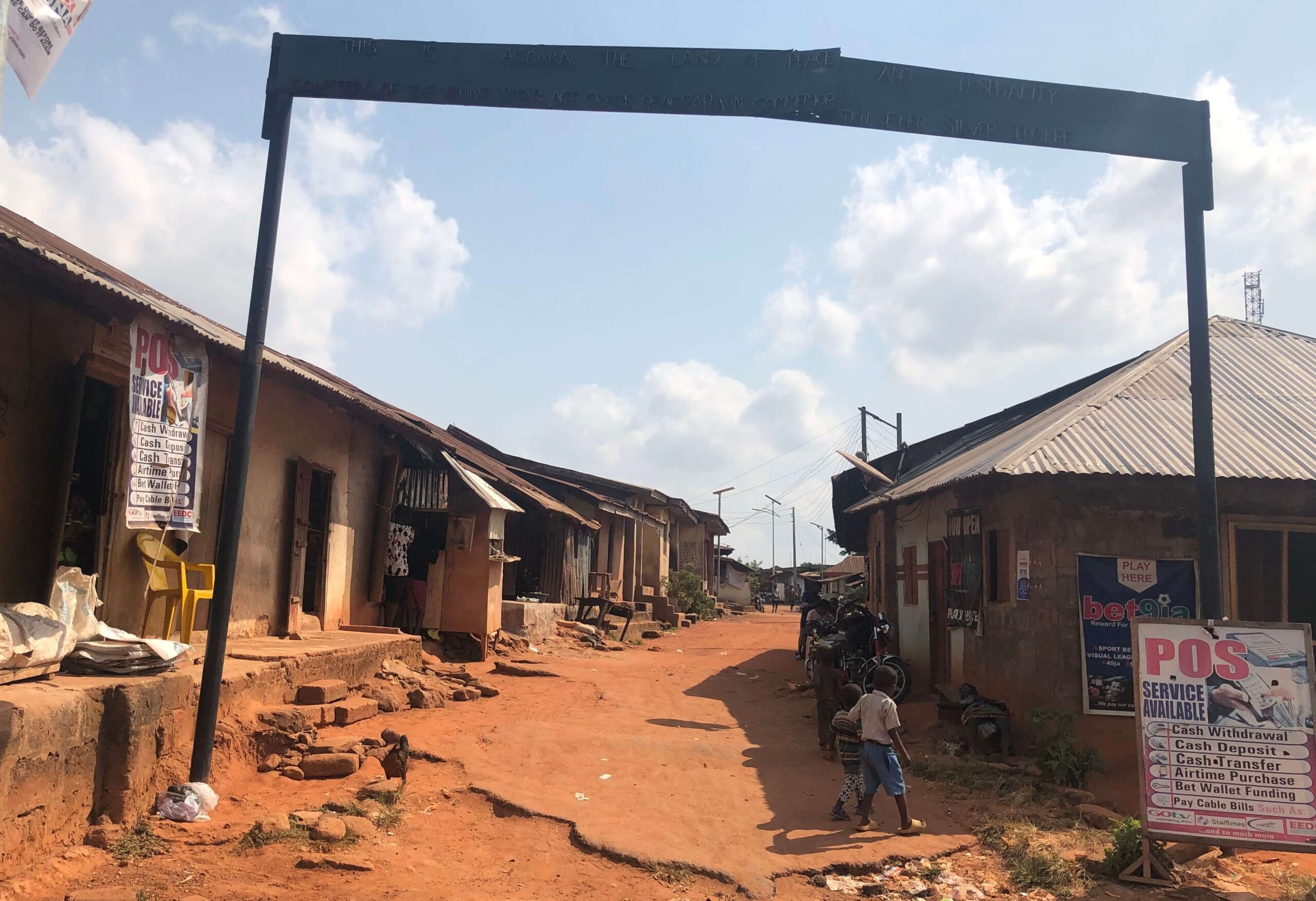AGBARA, CROSS RIVER: It is 6 pm in Ba Itakorghor, a small clan in Agbara community in Abi Local Government Area of Southern Nigeria’s Cross River State. Joseph Igiri breathes some fresh air into his lungs as he relaxes outside his home after a long day working on his farm, a chilly gentle breeze brushing his skin.
Four years ago, the 64-year-old would not dare sit outside his home for a minute because an unpleasant smell almost always hung in the air due to the prevalent open defecation practice.
Besides causing environmental pollution, open defecation or OD leads to human exposure to waste. And that exposure results in health problems like cholera, typhoid, and diarrhoea.
“When people defecate, flies would perch on the excreta and make their way into our homes where they also perch on our food and water, thereby making us sick,” Igiri told Prime Progress.
“Our women and children were the most affected,” added 40-year-old Janet Egbe in Legbo, the local language here. “We used to spend so much money trying to get treatment.”
At that time, most people in the clan had no toilets in their homes due to high poverty rates and ignorance. They used to cut big wood logs and line them up in bushes near houses; people climbed on the wood and defecated on the ground. A demarcation made of wood or bricks showed what sides were for males and females.
According to UNICEF, 673 million people practice OD and lack access to clean water for sanitation. Of those, 14 million result in typhoid and cholera cases every year. And 224,000 of those cases result in death.
Meanwhile, UNICEF says that West and Central Africa contribute 122 million (14%) to the global OD prevalence. Nigeria, which ranks second globally, has the highest number of people (47 million) defecating in the open in Africa.
Igiri’s Cross River has an estimated population of 4.4 million, of which half a million (11.4%) defecate in the open.
Community awakening
Most people in Agbara community (which Igiri’s clan is part of) are farmers growing rice, cassava, and yams. Every November or December, after harvesting and selling their farm produce, members of the community under different age grades come together to identify problems in their community that they would work to fix in the coming year.
The age grades are groups comprising people who fall within specific age ranges. Several of them exist in this community.
In November 2008, a youth age grade with members aged 25-35 decided they would build a block of three pit toilets the following year (2009) to reduce the rate of open defecation and its associated smell in Agbara.
These toilets are holes dug in the ground to collect waste. Their walls are reinforced with concrete bricks, and their surfaces are covered with concrete slabs.
They commenced work in January 2009 after members, numbering over 50, made voluntary donations of up to N200,000 (about $1,200 then). Eleven months later, the toilets were completed and opened for public use.
But by 2013, the project’s objective was nowhere close to being achieved as most people continued to engage in OD and refused to use the toilets. This was due to some limitations the age grade did not consider before building.
First, the toilets were built far from the heart of the nucleated settlement (where houses are concentrated in a particular area). Walking from the heart of the community to the toilets took 15 minutes, a distance too long for any person who urgently needed to use the toilet and unsafe for women and children, especially at night.
Also, the toilets were not lit. At night, people went with their torch lights and lanterns to use them. As people stopped using them due to these challenges, the age grade stopped maintaining them and locked them up.
Between 2012 and 2019, the Cross River State government, working with international partners like the Water Supply and Sanitation Collaborative Council (a United Nations body) and United Purpose (a global charity), supported local governments and communities in building their toilets and water facilities to fight OD.
Based on this, members of Agbara community and the Ba Itakorghor clan waited for about five years between 2012 and 2017, hoping to gain from the government effort. But that never happened.
In 2018, “After waiting in vain and getting warning messages from local health inspectors about the harm we were causing our people through open defecation,” members of Ba Itakorghor agreed to “build the toilets ourselves as the youths did,” said Damian Egbata, a local chief.
Drawing lessons from the youths’ project in the larger Agbara community, they agreed to build local squat toilets (with) pipes connected to soakaway pits, enabling people to flush manually after use. They also decided to construct the toilets in the heart of their clan for easy access.
Clan members were levied between N1000 and N3000 ($6 and $18 at the time), with women paying less. They realised about N600,000 ($1,666), and work began in January 2019.
Knowing the amount raised would not be enough, some youth and children volunteered their time, energy, and skills. Some fetched water; others dug the foundation and soakaway pits. Some moulded bricks and nailed the roof. Ten months later, they had completed the construction of 14 toilets – seven for males and seven for females.
The toilets, still functional, are always open. Before noon daily, an employed cleaner washes and disinfects them. Sometimes, there is a call for every clan member to come out to clean them and clear the bushes around them. Children below the age of 10 are not allowed to use them without adult supervision, so they do not mess them up.
Today, about 300-350 people out of about 500 citizens who comprise this clan use these toilets daily.
Setbacks
However, because the toilets have no water tanks like the modern ones, people come with water in buckets from their homes to flush after use. It is a tiring process because Agbara community, with its 10,000 population, suffers water scarcity generally, especially during the dry seasons. As a result, people do not carry enough water to flush the toilets properly.
The community has about five hand pump boreholes built by the government in 2015. But water from them flows at intervals, is coloured, produces an unpleasant taste and is unhealthy for domestic use. Sometimes, too many people struggle to fetch before the water stops flowing.
Their other option is a local reservoir they constructed twenty years ago. The reservoir is sourced from a stream inside a thick forest, a 20-minute walk away from the community. The road to it is a small path surrounded by heavy shrubs and trees on both sides.
The reservoir was constructed using bricks to build a wall around the stream with a filter inserted into a small opening that allows water to flow out. During dry seasons, the water level in the reservoir drops and people cannot get enough water for domestic use and toilet flushing. This sometimes leaves the toilets very messy, giving the cleaner a tough job.
Like the youths’ abandoned pit latrines, the new toilets are not lit. For some, the absence of light provides a perfect opportunity to sneak out at night and defecate in the open, making it hard to end OD completely.
“Some people still prefer to defecate in open spaces. And if you confront them when caught, they will tell you they feel more relaxed when they defecate in the open or that they cannot use toilets shared by many people,” said Igiri.
He adds that the clan will keep working to convince all members to use the toilets despite minor limitations.
In the end, the Ba Itakorghor toilet project is unique because it tells the story of a small and poor village conceiving and implementing an idea to solve its identified problem without the support of the government or any external growth.
This story was produced with the support of Nigeria Health Watch through the Solutions Journalism Network, a nonprofit organisation dedicated to rigorous and compelling reporting about responses to social problems.
The Agbara community in Cross River, Nigeria, faced severe issues with open defecation, causing environmental pollution and health problems. Initially, efforts by the youth to improve sanitation by building pit toilets in 2009 failed due to poor location and lack of lighting. However, in 2018, the Ba Itakorghor clan took inspiration and initiated their project, constructing 14 accessible and functional toilets funded by community contributions. Despite ongoing challenges like water scarcity and lack of lighting, the project has significantly reduced open defecation, with 300-350 out of 500 clan members using the facilities daily. The community continues to work on overcoming these limitations and ensuring wider adoption of the toilets.
This story exemplifies a community-driven solution to sanitation, achieved without external assistance, demonstrating resilience and self-reliance.






